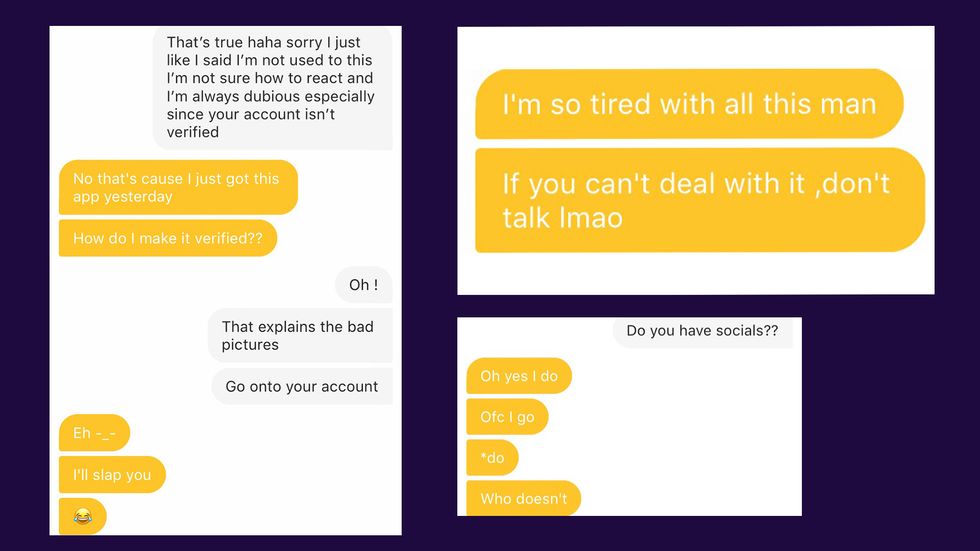In the age of online dating, douchebags have a new platform and catfish are on the rise. I set out to explore, through the modern romantic comedy that is my love life, if there is a difference.
It all started out much like every other match I had made on Bumble. An attractive guy, let's call him Chad, so of course I was going to make the first move and "matched".
Early signs were good. Chad was responsive and effusive. He clearly wanted to engage. Within a few minutes of chatting he started laying down compliments, referring to me as "cutie'' and "baby girl'' in every second message. As an experienced online dater, I knew this wasn't usual "first chat" behaviour. I wasn't thrilled by the cutesy names but, hey, he was a good-looking guy, I could get past it.
To deal with it, I jokingly challenged him on whether he was a catfish, someone who lures another person into an online relationship via a fictional online persona. He didn't take it as a joke. "Is complimenting associated with being a catfish? Why on earth would you judge someone 'cause of the way they look?" was his response. He took offence at the implication that a good-looking guy would not give so many compliments.
Catfishing is on the rise. It's not illegal under Australian laws but can be used to commit serious offences like financial fraud. The Federal Government's ScamWatch reported almost 4,000 dating and romance scams in 2019, with losses of more than $28.6 million.
The term is relatively new, deriving from the 2010 documentary film Catfish, about a New York photographer deceived, via Facebook, by a woman in the American Mid-West, using multiple profiles on the social network. Recognising the social phenomenon for what it was, MTV then commissioned a multi-season reality TV show on the issue. I studied Catfish: The TV Show, in high school, so I think I know what to look for.
I know what you're thinking, with so many pink flags, why was I still dealing with this guy.
I told my friends about Chad. They said he was "gaslighting" me in his response to my catfish challenge, manipulating information to make me look bad, as though I were in the wrong, rather than him. I agree he had been, at the least, a little defensive but I wanted to give him a chance.
We stayed "matched". On Day 2, I started receiving sexually explicit and inappropriate messages which made me very uncomfortable and I told him I didn't like it. Rather than challenge him again on whether he was a catfish, I took a different tack. I asked him more personal questions: what he studied, where he lived, the usual, as you should when you become a little suspicious. He said he was studying, on scholarship, at a Sydney university and he lived close by. The replies seemed genuine so I still had some hope that he was a normal guy.
Then on Day 3, it got weirder. He wrote: "I really want you. I'm going to work so hard to have you, that's a promise." If this was coming from a guy I had been dating for a month or so that would've melted my heart, but from some guy I had been talking to for three days, not so much.
Bumble, a women-empowered dating app, is set up so only females can make the first move, thereby eliminating unwanted advances on the app. This is why many women prefer it to apps such as Tinder. And, in a bid to reduce catfishing on the site, Bumble has introduced a "blue-tick" profile verification feature which they promise will "kiss the catfish goodbye".
The blue tick allows users to show that they are the "real deal", and not a catfish. Using a profile image verification test, Bumble compares a live shot of the user to images they have uploaded on their account for confirmation they are one and the same person. In a further step, users can connect their Bumble account with other social media accounts such as Instagram or Spotify playlists.

Guess who wasn't verified? Chad. The verification feature is not mandatory, but many users do it so other "Bumblers" can see more of them. I had a proper look at Chad's Bumble profile and was reminded that there wasn't much on it; no bio (which is always odd because how hard is it to write a bio?), very few pictures and no other social media proofs.
I told Chad that he should verify himself (it takes less than five minutes), and he acted like he was genuinely interested and that it was something he planned to do. He didn't follow through.
Since the verification suggestion hadn't worked, I asked for his social media – he was quick to brush this request off. I know what you're thinking, with so many pink (if not screaming red) flags, why was I still dealing with this guy. I had the power to send him to the "unmatched" bin. The truth is, by this stage, I was curious to know what his game was.
"OK I'll be honest," I told him on Day 4, "a part of me thinks this is just one big prank and you're a catfish even though you said you weren't. So, until you prove you're not. We are not going out."
His response was a challenge: "Why don't you just unmatch lol. You keep saying this, it kills the joy out of me. I can't be listening to this daily man. Just unmatch."
That's the second time Chad has become defensive when I asked him the catfish question, but he's also never answered it. By now I had a plan, to meet him face to face and call him out to see who he really was.
I agreed to a date. I was excited, I planned to get a camera ready and blog the meeting on the night of the date, just like the Catfish TV show. One, for safety reasons, and two, I was just so sure at this point he was one.
Plot twist. He decided to tell me, only now, five days after we matched, that he's not from Sydney and is actually British, with the accent and all. Didn't anyone tell him that girls go crazy over the British accent? If I were him, I would have '"advertised" this earlier.
The night before the date, his behaviour and tone changed, no cringeworthy "baby girl" or "cutie" that night. "I'm tryna build up something for you, you give me shit and kill the vibe," he said, becoming almost verbally abusive. "You can't expect me to be perfect while you kill the vibe every damn time."
Ok, time to unmatch. There would be no date, as much as I wanted to expose him, I just couldn't tolerate his awfully rude behaviour anymore. Bumble has a built-in complaint mechanism that allows users to report and block a match like this one. I did report Chad.
But for me, the question of "Is Chad a catfish?" remains. The way things ended was more a trait of a douchebag than a catfish, at least that's what my friends and I think. And yet, the interactions, the defensiveness, the suspicious behaviour – it just doesn't add up. Douchebag or catfish?
Chantelle completed a Bachelor of Media (Communication and Journalism) degree at UNSW. She has done work experience at Big Splash Media where she was first published in print. She hopes to one day work in the broadcast media industry.






Afraid of an egg: the tyranny of living with social media's body standards